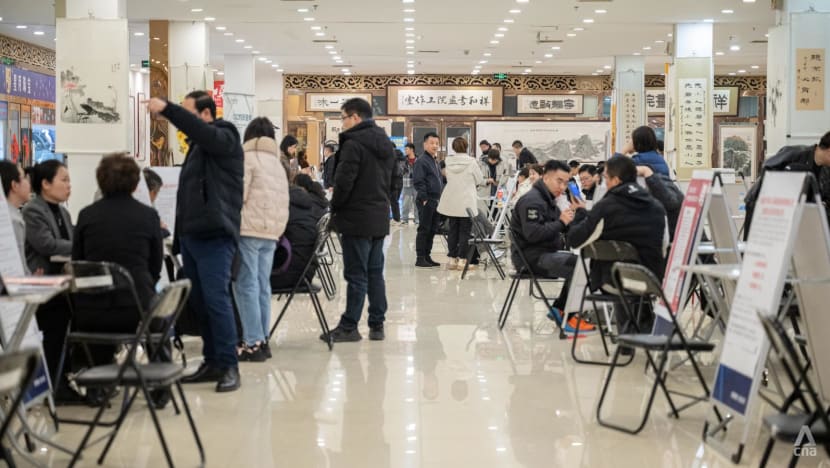China shuts social security loophole - so why are some workers more insecure now?
China will ban informal arrangements between workers and employers to opt out of mandatory social insurance payments from Sep 1.

Workers and shoppers pass through Taikoo Li Sanlitun, a major commercial district in Beijing on May 12, 2025. (Photo: CNA/Hu Chushi)

This audio is generated by an AI tool.
SINGAPORE: For years, many of China’s lowest-paid workers have chosen bigger paychecks over future benefits, sometimes even signing contracts with employers to waive mandatory social insurance contributions.
But that is set to change on Sep 1, when China’s top court will ban informal arrangements between workers and employers to opt out of mandatory social insurance payments.
The Supreme People’s Court emphasised in a briefing on Aug 1 that employers offering cash incentives in lieu of insurance are violating the law.
“Some workers request employers to provide insurance contributions directly to them as subsidies in order to receive higher wages,” said Judge Zhang Yan, adding that some companies have also been avoiding payments to cut labour costs.
Officials say the goal is to strengthen the long-term sustainability of China’s vast welfare system, already the world’s largest covering more than one billion people, while protecting the country’s rapidly ageing population.
But experts warn that lower-income workers and small businesses are likely to bear the brunt of these changes.
A BLOW TO THE MOST VULNERABLE
Ao Xiang, 35, runs a small tailor shop in Nanchang, the capital of Jiangxi province.
He employs three full-time workers and pays each around 8,000 yuan (SG$1,437) per month.
On top of that, he pays 976 yuan in social insurance for each employee, the mandated employer contribution of 24.4 per cent of the minimum monthly contribution base of 4,000 yuan.
He explained that like many small and micro businesses in the country, he opts for the minimum contribution base.
Employees themselves contribute nearly 12 per cent of their monthly salary to social insurance.
While Ao himself pays social insurance for his employees, he has observed that in many workplaces, workers tend to prefer a higher salary over full benefits.
“If social insurance is paid, a worker’s take-home salary might be 2,500 yuan. Without it, (take-home pay) could be 3,500 yuan,” Ao explained.
“The choice was theirs and employees would often choose the latter.”
“But of course, employees can’t do that anymore,” he said.
Under China’s law, social security contributions to pension, medical and other funds are mandatory. Contribution percentages vary across different regions in the country.
“Workers with already modest salaries will see a larger share of their disposable income go toward contributions,” said Han Jian, a management professor at the China Europe International Business School (CEIBS) in Shanghai.
The minimum salary cap used to calculate social insurance contributions creates another layer of inequality, according to Liu Xiangqing, assistant professor at the International Business School Suzhou at Xi’an Jiaotong-Liverpool University (XJLTU).
In Suzhou for instance, social insurance contributions are calculated based on a minimum salary of 4,879 yuan - even for workers earning less.
For pension insurance, employers and employees contribute 16 per cent and 8 per cent respectively.
“In Suzhou, the minimum and maximum contribution base is 4,879 yuan and 24,396 yuan in 2024,” Liu said. “If your salary is lower than 4,879 yuan, your contribution should (still) be based on the 4,879 yuan contribution rate,” said Liu.
For a worker earning 2,000 yuan a month, that amounts to a monthly pension insurance payment of 1,171 yuan - nearly 60 per cent of the worker’s salary.
In contrast, a worker earning 10,000 yuan can also opt to contribute based on the minimum cap, making the total contribution just around 10 per cent of their income.
“For many low-income workers with no expectation of wage increase, it is not fair to them,” Liu said.
“Ideally the social security system should benefit the disadvantaged group more, but the current system does not give them enough incentive to participate.”
Ao, the tailor, shared that some people believe that if they contribute more to social insurance, the amount of “immediate usable cash” they take home becomes smaller, which lowers their current standard of living.
There is also a deep urban-rural divide.
“Urban employees typically have access to a more comprehensive package of benefits - pensions, medical care, and unemployment insurance,” said Han.
“By contrast, rural residents and informal sector workers often face weaker coverage,” she added.
And the difference is stark. At the end of 2023, the average monthly pension for a retired urban employee was 3,700 yuan. In contrast, residents in rural areas received an average of just 223 yuan a month.
“Bridging this disparity must be a central focus of China’s current social policy reforms,” Han said.
“Farmers and other low-income groups receive only basic benefits, and the burden of contributions is rising,” said Liu.
For small businesses, it would mean a double blow in a difficult economic climate.
“Many are already operating on thin margins,” Han said. “These mandatory contributions raise their labour costs, potentially pushing some out of business.”
Some low-income workers could even be pushed out of formal employment altogether.
“Some (businesses) may respond by hiring fewer staff, turning to informal employment arrangements, or cutting back on expansion,” Han added.
On the other hand, there are also potential benefits of mandating social insurance payments for small businesses.
“Providing social insurance may improve employee morale and retention, leading to a more stable workforce and lower turnover,” said Liu.
CRACKING DOWN ON LOOPHOLES
Experts generally agree that tightening loopholes in the social insurance system is a step in the right direction.
“The system is clearly advancing in the right direction, yet further reforms and subsidies are needed to enhance its fairness and accessibility,” Han said.
“Pension payments rely on long-term contributions,” Han added.
“If large numbers of people stop paying, many will reach retirement age without support, risking elderly poverty and social instability.”

The country’s elderly population over 60 is projected to exceed 500 million by 2050, placing unprecedented pressure on the pension and healthcare systems.
Beijing views expanding the contributor base, especially among informal workers and private-sector employers, as critical to shoring up future payouts.
In the long run, a sustainable welfare system is helpful for the transition from an investment-and export-based economy into a consumption-based economy, Liu said.
“With a healthy social security system, households feel safe to spend money and do not need to save money for unexpected shocks. But in the short run, I could not see a direct link between the recent reform and the public confidence in the economy.”
For Ayako, 31, who works in a gaming company in Shenzhen, companies that don’t pay social insurance are a red flag.
“Some don’t provide insurance during the probation period. If we encounter such companies during interviews, we wouldn’t join them,” she told CNA.
But awareness is rising.
“People are more aware of their legal rights now,” Ao said. “If an employer doesn’t contribute to social insurance and the employee reports it, the employer can get into serious trouble.”
Even so, for business owners like Ao, who is not required to pay social insurance, the choice is clear. “I don’t pay social insurance. Firstly, being a tailor means I can work until I’m 90, I have no plans on retiring.
“I’m more willing to save the money for myself, young people nowadays are unwilling to have kids, and I’m afraid the pension fund will run dry in the future.”



















